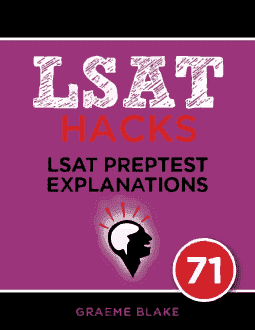QUESTION TEXT: A recent taste test reveals that most…
QUESTION TYPE: Strengthen
CONCLUSION: The complexity of chocolate probably masks the low fat flavor.
REASONING: Studies compared regular and low fat versions of ice cream flavors. Compared to regular ice cream, people dislike low fat vanilla, but they don’t mind low fat chocolate. Chocolate has a very complex flavor.
ANALYSIS: This argument makes a classic LSAT error. The author makes a comparison between chocolate and vanilla, but they don’t give us any information about vanilla! A comparison must give information about both groups.
So, we don’t know anything about vanilla. Maybe it’s complex too! In that case, we’d need another explanation for low-fat chocolate’s appeal.
___________
- It doesn’t matter whether people prefer chocolate to vanilla. The argument’s comparison is between full fat and low fat versions of the same flavors.
- This might mildly strengthen the argument. An experiment *is* better if done blind. This answer at least shows the vanilla test was done blind. However, we don’t know if the chocolate test was done blind. Further this is at best a minor strengthen, as an unblinded test can be successful.
The central problem with this argument is that it didn’t tell us whether vanilla has a complex flavor. That’s why D is correct. - The argument didn’t say chocolate worked because people liked it. The argument proposed that the complexity of chocolate’s compounds masked the low fat flavor.
- CORRECT. The author made a comparison between chocolate and vanilla, but didn’t tell us anything about vanilla! This answer completes the comparison: chocolate is indeed more complex. Therefore complexity could have caused the difference.
- Awareness isn’t relevant. People perceive the complexity of chocolate when they eat it, whether or not they are aware chocolate is complex.
Also note that this answer doesn’t say the people in the studies were aware of complexity – it only says “most people” are aware of complexity.
Recap: The question begins with “A recent taste test reveals that most”. It is a Strengthen question. To practice more Strengthen questions, have a look at the LSAT Questions by Type page.

Free Logical Reasoning lesson
Get a free sample of the Logical Reasoning Mastery Seminar. Learn tips for solving LR questions


Is B’s explanation correct in stating that the bias would be present in both the chocolate and vanilla tests? If I look at answer B, it references the subjects of the previous tests, and in the stimulus we’re only told that the previous tests involved vanilla (it’s the recent test that covers chocolate ice cream).
You’re right, I missed this when writing my explanation. Updating it. Thanks!
Note: This is an old comment but I wanted to clarify the point.
Hello,
Referring to your explanation of C, “The argument didn’t say chocolate worked because people liked it. The argument proposed that the complexity of chocolate’s compounds masked the low fat flavor.” The premise did say chocolate worked because people liked it. In fact, the premise doesn’t say they liked it because it masked the flavor, they could have thought it tasted completely different, it just said they still liked it. So, my question is here, does the conclusion take precedence over the premises on what creates “the argument.” I feel like normally thats an easy answer, the conclusion, but here having not necessarily sound logic throughout construes the answer choices.
Thank You!
Let me clear up what I was distinguishing.
* Liking *chocolate* vs.
* Liking *the low fat version when there is chocolate*
Unsweetened chocolate by itself tastes pretty terrible. But it has a complex flavor. And in conjunction with the other ingredient in low fat chocolate ice cream, this complex flavor masks the harsh taste of low fat.
So the question here is what “it” refers to in the premise. It is the entire thing, “low fat chocolate ice cream” and not the specific ingredient, chocolate.
Note: This is an old comment but I wanted to clarify the point.
Hi,
I don’t understand why D wouldn’t weaken the conclusion. Wouldn’t people knowing that vanilla is a significantly less complex flavor than chocolate skew the results and give us another reason for the effect that we see?
There are two issues with this:
1. “Vanilla is known to be less complex” doesn’t mean *everybody* knows it. It could be “known” in the sense of being an obscure but provable scientific fact. In other words, it is expert knowledge but not common knowledge.
2. Even if it *is* common knowledge, that doens’t mean people know the implication of this knowledge. They might not know that complex flavors like chocolate mask the taste of low fat, so there’s no bias in the results.
In other words, you need to add two additional assumptions for your interpretation even to be plausible.